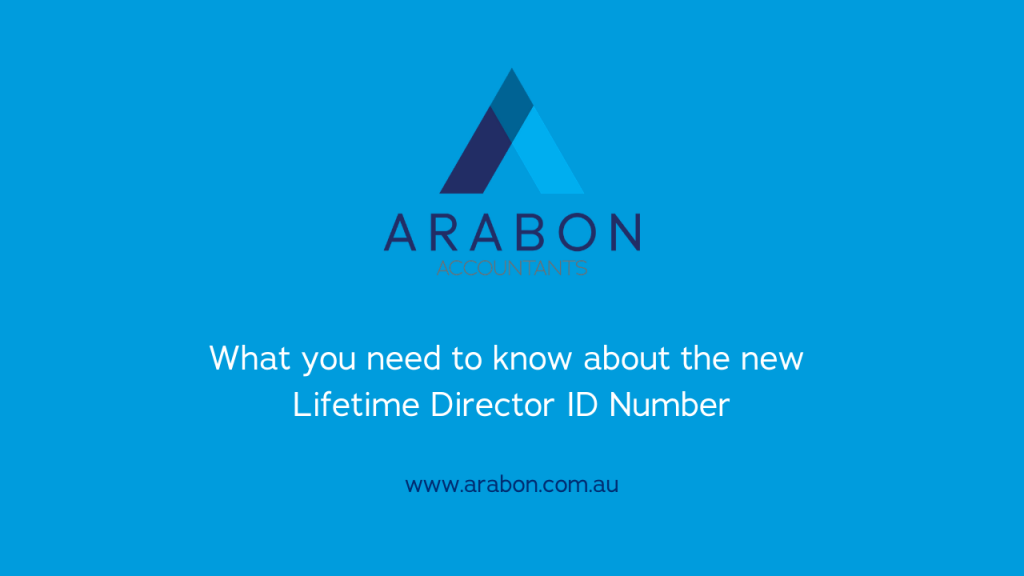Following a review of Australia’s business registers, Directors will be required to register for a new lifetime director ID number, much like a tax file number.
The introduction of the new lifetime Director Identification Number (DIN) regime is part of the Government’s Modernisation of Business Registers (MBR) Program creating greater transparency and monitoring of the movements of individuals over time. The MBR will merge the Australian Business Register and 31 ASIC business registers, including the register of companies. Essentially, the system will establish one source of truth across Government agencies for individuals and entities and will be managed by the Australian Taxation Office (ATO).
Why the need for the new lifetime Director ID number?
ASIC currently does not verify the identity of Directors and any name could be registered as a Director. Under the new regime, all Directors will need to verify their ID and will be supplied a number for life. Even if they cease to be a Director, the number will stay with the person should they wish to use again in the future. The intent is to be able to trace a director’s relationships across companies, especially those which fail and prevent fictitious identities.
The target is illegal phoenixing. Phoenixing is when directors transfer the assets of an existing company to a new company without paying full value, leaving the debts with the old company. Once the assets have been transferred, the old company is liquidated leaving creditors out of pocket. Phoenixing has a ripple effect in the community and is estimated to cost between $2.9 billion and $5.1 billion annually. The real brunt of the impact is to the unpaid creditors – mostly customers and contractors, unpaid employee entitlements and the broader cost through unpaid taxes.
Once the assets are transferred to a new company, the directors then continue to operate the business in a new entity. They just set aside the problems and start again with the benefit of the good parts of their old company as a foundation.
Who will need a new lifetime director ID number?
The DIN is very broad and introduces the concept of an ‘eligible officer’. An eligible officer is a director who:
- Appointed Directors
- Alternate Directors
- Acting Directors (even if the name of the position is not officially a Director)
- Any other officer registered
The definition picks up the concept of ‘shadow directors’ who act in the capacity of directors through influence and control but are not directors by title. That is, it’s feasible that someone who is not a director but is seen to be making decisions on behalf of the company can be held to account.
How and when do I need to register a DIN?
When the system opens, directors will need to apply for an ID through their myGov account. If you do not have a myGov account, it would be a good idea to create an account and become familiar with how it works. Your myGov account creates your digital credentials to verify who you are.
Existing directors will have until 30 November 2022 to apply and obtain a DIN. For the first year of the program, new directors will have 28 days to apply for a DIN from the time of their appointment. From the first year onwards, you will need to have a DIN prior to being appointed as a director.
What you need to know
It’s important that anyone agreeing to be a director understands the implications. Being a director is not just a title; it is a responsibility. At a financial level, directors are responsible for ensuring that the company does not trade while insolvent. The by-product of this is that the directors may be held personally liable for the debt incurred. The director penalty regime has also been tightened in recent years to ensure that directors are personally liable for PAYG withholding, net GST and superannuation guarantee charge liability if the company fails to meet its obligations by the due date. For many small businesses, the directors are also often personally responsible for company loans secured against property such as the family home.
Failing to perform your duties as a director is a criminal offence with fines of up to $200,000 and five years in prison.
Ignorance is not a legal defence. Don’t sign anything unless you understand the consequences.
If you would like to learn more about how this change may affect you, contact us on 1300 ARABON.






